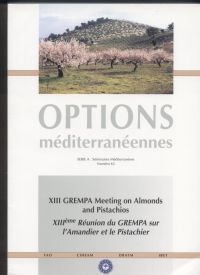| Article précédent | p. 101-105 | Article suivant |
Physiological and genetic determination of self-compatibility in an almond breeding progeny
Previous studies have shown the presence of self-incompatible seedlings in progenies of 'Ferralise' (S1S3) x 'Tuono' (S1Sf), whereas in other crosses from parents with the same S genotypes, like 'Ferragnès' x 'Tuono', all seedlings were found to be self-compatible. With the stylar S-RNase determination, all seedlings of a 'Ferralise' x 'Tuono' progeny were characterized as self-compatible because they possessed the Sf allele. However, after four years of microscopic observations we have concluded that 10 seedlings are self-incompatible because their own pollen is unable to reach the base of the style, whereas 8 seedlings show inconclusive behaviour. Consequently, other genetic factors, besides the presence of the Sf allele, may be responsible for the pollen compatibility reaction in this progeny. One of these factors may be inbreeding, whose expression in some individuals of the 'Ferralise' x 'Tuono' progeny would explain the different results obtained in comparison to the 'Ferragnès' x 'Tuono' progeny.
- [ Afficher ]
- [ Télécharger ]
- [ Exporter la citation ]
Vous pouvez télécharger la citation au format :
- [ Imprimer ]
-
Mots-clés
AUTOCOMPATIBILITE, CROISSANCE, INBREEDING, PRUNUS AMYGDALUS, TUBE DU POLLENCiter cet article
Alonso J.M., Socias i Company R. Physiological and genetic determination of self-compatibility in an almond breeding progeny. In : Oliveira M.M. (ed.), Cordeiro V. (ed.). XIII GREMPA Meeting on Almonds and Pistachios . Zaragoza : CIHEAM, 2005. p. 101-105. (Options Méditerranéennes : Série A. Séminaires Méditerranéens; n. 63). 13. Meeting of the Mediterranean Research Group for Almond and Pistachio, 2003/06/01-05, Mirandela (Portugal). http://om.ciheam.org/om/pdf/a63/05600017.pdf



